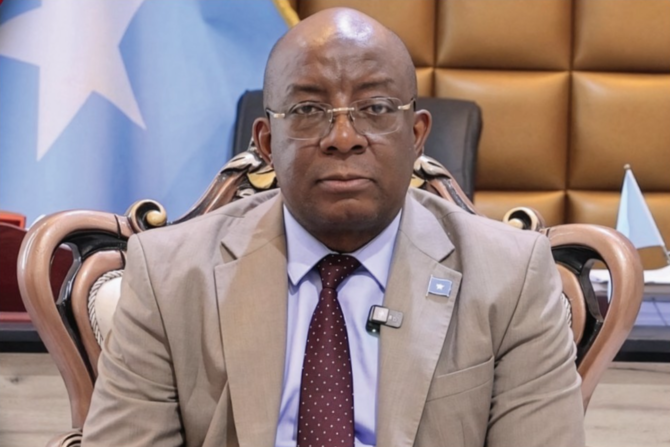LONDON: The family of a Sudanese surgeon who died from coronavirus has called for the British government to do more to protect hospital staff.
Adil El-Tayar, an organ transplant consultant in London, who had also worked in Sudan and Saudi Arabia, was the first National Health Service (NHS) surgeon to die in the UK as a result of COVID-19. The 63-year-old passed away last Wednesday.
“Our view is that the NHS needs to do much more to protect the frontline workers (and) it’s unacceptable that in 2020 in the UK, there is even a question about whether the frontline workers are well protected and they should have been testing frontline staff from the very beginning,” Othman El-Tayar told Arab News.
He questioned why the NHS, who have not been touch with the family since El-Tayar's passing, is not testing their doctors on a regular basis, let alone testing potential COVID-19 patients.
“They tell us just to stay at home for a week and they tell you not to come to hospital unless you become short of breath, at which point it’s too late. So don’t come to the hospital unless you’re coming to die. I mean, it’s absolutely unbelievable,” he said.
El-Tayar, who is also a doctor and has been in self-isolation after developing symptoms, said his father came home from work feeling unwell and began to develop a fever the following day, which he treated with paracetamol.
“Then the temperature progressed, he developed a loss of appetite, had generalized body pain, and that persisted for a few days, but around the fourth day we were becoming concerned because his symptoms weren’t improving,” he said.
After a couple of days, they contacted the non-emergency health number, as per the NHS’ instructions, to get advice and El-Tayar said they were told he should stay at home and wait.
“The next day we called an ambulance because he was still short of breath and still feverish and we took him to the hospital and he was taken to the ICU (intensive care unit),” he added.
He also said that his father was put on a ventilator, but his condition quickly declined and worsened every day and within three to four days he had passed away.
Othman said that his “father helped so many people throughout his life, not just through medicine, just as a person as well.”
He said he hoped his father’s legacy will live on.
“People need to be aware that this isn’t just a virus and just numbers on the television screen, this is now very real.”
The UK government came under renewed pressure Tuesday over the shortage of protective equipment for health workers and the lack of coronavirus testing available for doctors and nurses.
Dr. Jenny Harries, the deputy chief medical officer for England, apologized for the delay in getting personal protective equipment to NHS staff.
El-Tayar was volunteering on the frontlines against the outbreak in a hospital in central England.
His cousin, the British-Sudanese broadcast journalist Zeinab Badawi, paid tribute to the surgeon.
“He wanted to be deployed where he would be most useful in the crisis,” she said on the BBC.
Another cousin, Dr. Hisham Al-Khader, the former head of the Sudanese Doctors’ Syndicate in the UK, said El-Tayar “was a pivotal person in our family, and he is highly respected by many people in his country, the Gulf (region) and Saudi Arabia, where he spent a good deal of time.”
Thousands of Sudanese doctors deployed throughout Britain are working on the frontlines of the war against the coronavirus pandemic.
“We doctors are currently already open to the disease, and we need a little more protection than what is offered,” Al-Khader told media.
His colleague, Dr. Nabil Mahmoud Ahmed, the union’s secretary and psychiatrist, said the union and other medical associations and organizations have continued to notice a significant shortage of protective equipment for doctors.
The British ambassador to Sudan, Irfan Siddiq, also praised El-Tayar for his efforts in a tweet and expressed sadness over his demise.
Saddened to hear of #Sudan-ese doctor Adel Altayar's death in the UK from Covid-19. Health workers around the world have shown extraordinary courage. We cannot thank them enough. In this fight we must listen to their advice. #coronavirus #StayAtHome https://t.co/MGzehDylZX
— Irfan Siddiq (@FCOIrfan) March 26, 2020
On Monday, health workers paid tribute to another Sudanese-born health worker who died from coronavirus in the UK.
Amged El-Hawrani, 55, an ear, nose and throat consultant, died in Leicester on Saturday.
Meanwhile, an NHS surgeon, who asked not to be named, reiterated to Arab News that the UK government, and the health services need to do more to protect frontline doctors and nurses and said she was disappointed with the British media’s coverage of the death of the two Sudanese doctors, who were the first two practitioners to die in the line of duty, and wondered why such both devastating fatalities were not covered properly.
“Is it because of the ethnicity of the doctors, or because frontline employees do not matter and are expected to die?”













